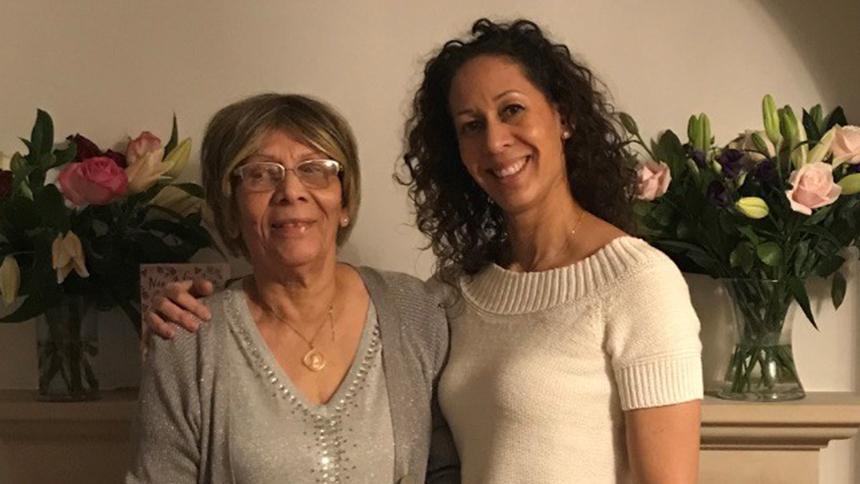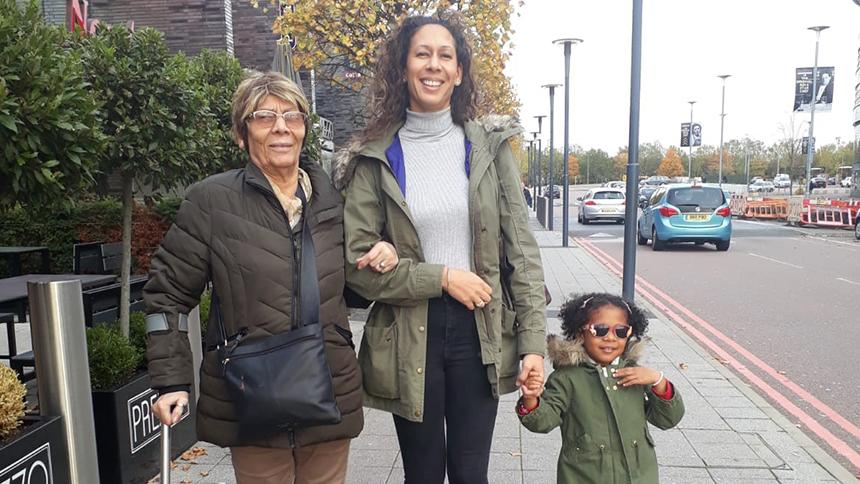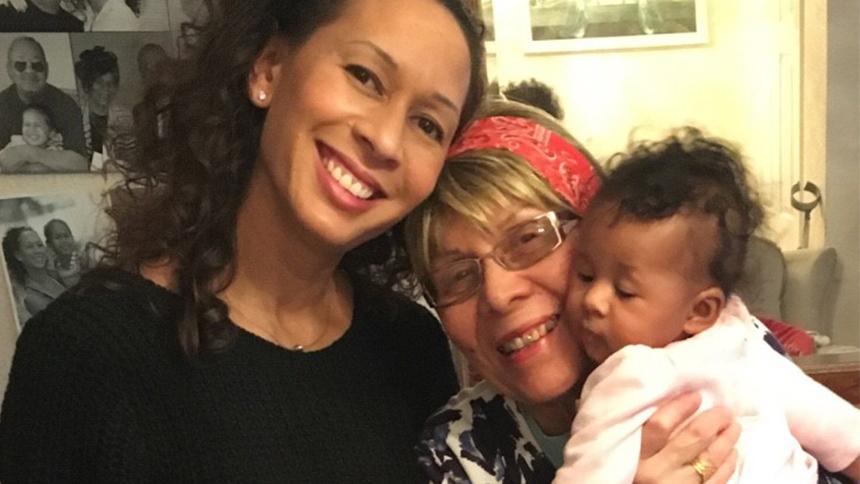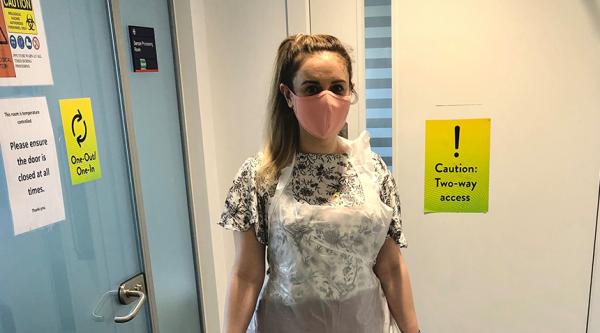Keeping it all together: Staying strong for a mum who has dementia
Yvonne Ducasse is doing all she can to keep her family safe during the pandemic.
‘It’s been a really tough time all round and I’m feeling the pressure, but I can’t crack and go down as everything would fall apart,’ says Yvonne Ducasse.
She’s been working four days a week while single-handedly supporting her mother and young family through the pandemic.
‘I can’t tell you how stressful it is to balance work, my children’s wellbeing and Mum’s safety. I feel like a hamster on a wheel as I try to be everything to everybody,’ she says. ‘But if Mum died of the virus I’d feel like I’d failed her, I’d never forgive myself.’

Yvonne lives with her mum Joyce.
Core values
Yvonne lives in Buckinghamshire with her two children, age four and 12, and mum Joyce, who’s 80.
Joyce was diagnosed with Alzheimer’s disease in 2017, while still living alone, after Yvonne became concerned about changes in her Mum’s behaviour.
‘Her washing was piling up, she wasn’t cooking properly and she was slowly going downhill. I took her to the GP who referred her to the memory clinic,’ she says.
Joyce is a former nurse who has always been a very caring person.
‘She was quite dynamic, good at forward planning, very kind and generous, shrewd, smart and well put together,’ says Yvonne. ‘The dementia hasn’t affected her core values – she still asks if there is anything she can do for the children.’
Following her diagnosis, Joyce’s memory problems continued to present challenges.
‘She was frequently losing her keys and wasn’t doing her shopping as she used to. She’d forget how to turn the TV on and would just sit in front of it,’ says Yvonne.
‘The thing that really stood out for me was when she disappeared from home one Sunday and I couldn’t get hold of her. Eventually, I went into town and found her sitting on a bench. She said she was waiting for a taxi, but I checked her phone and she hadn’t called one.’
Daily battles
Deciding that something had to change, Yvonne moved from London to Buckinghamshire, to a house that was also suitable for Joyce.
With Yvonne working in London to support her family, in a demanding human resources role for a financial company, carers would come in to support Joyce. Although things were far from easy, the arrangement provided consistency and security for Joyce. However, everything changed with the arrival of COVID-19.

Yvonne also supports her young family.
‘I was wary of the virus very early on, so I stopped Mum’s carers and our cleaners, to minimise the risk,’ says Yvonne, who also took her children out of school.
‘I was home schooling, working, cooking and cleaning, and having battles with Mum every single day about her hygiene or getting out of bed. I’ve taken away all the support systems that were there to make my life easier, to my own detriment. It’s been very tough, as the responsibility has been 10-fold since COVID, but if anything happened to Mum, I’d have to live with that.’
Even more alone
Yvonne found the early months of the virus difficult, but life became even worse later in the year.
Although her employer is very understanding and provides flexible working arrangements, Yvonne still finds herself working until midnight on some occasions. She’s even taken over the care of Joyce’s African grey parrot, without which she worries her mum might decline even further.
‘At least the adrenalin kept you going the first time round, but this time I’m just tired,’ she says. ‘The struggles have morphed into daily life for me. I don’t see family or colleagues and life has almost been on hold. It’s really isolating.
‘People say they understand, but I don’t think they really do. But I also don’t want to complain about things too much, because it just becomes diluted.’
Joyce’s memory problems can also be challenging.
‘Mum gets fixated on stuff that she hasn’t got control over anymore, always asking me the same questions over again,’ says Yvonne, who feels that Joyce has deteriorated slightly during the pandemic. ‘I don’t want to appear rude or ignore her, but how do you deal with that every five seconds?
‘She’ll also swear blind she’s done things that she hasn’t. I have to have a conversation with myself, to let her be.’
Dementia Support Forum
Best place
Joyce has chronic obstructive pulmonary disease and bronchitis, and has been shielding throughout the pandemic. She only leaves the house for medical appointments.
‘If I tell her about the virus, she’ll understand it in the moment, but she doesn’t understand the dangers and risks, so I can’t be complacent about it,’ says Yvonne, who has been encouraging Joyce to do chair exercises to stay active.
Yvonne strongly believes that Joyce is better off living at home.
‘I know there are some great care homes out there, but God knows if Mum would have survived,’ she says. ‘I feel like Mum is in the best place here.’
To make matters worse, Yvonne is also in an ongoing battle with the council over social care support for Joyce.
‘When Mum was living on her own and having to pay rent, she got free social care. But when we moved here they started charging her, because even though she’s contributing to the mortgage, she isn’t legally liable to do so. I’m challenging it, because I think it’s awful and really unfair,’ says Yvonne.

Yvonne and her family before the pandemic.
Very precious
Yvonne says that Joyce’s appreciation helps to keep her going.
‘Sometimes I feel like I don’t have the capacity or energy, but when Mum says, “You’re a really good daughter to me,” that resets me,’ she says.
Yvonne also doesn’t want anyone to feel sorry for her.
‘The responsibility is on my shoulders and I’ve got to keep the plates spinning, but it’s my choice and I’m not unhappy,’ she says.
She also considers whether others in a similar situation might relate to her experiences.
‘I’ve got nothing to be ashamed of, and it may help people to know that they aren’t alone, and that it’s OK to feel how they feel,’ she says.
And despite the major challenges she faces, Yvonne wouldn’t have things any other way.
‘Mum feels secure with her family and is around people who love her. She is very precious, and we know what she has done for us in our lives,’ she says.
What can you do to help?
You can help support people who are caring for a relative or friend with dementia.



Julie Jacobs-Obodai
saysThanks for sharing your story Yvonne. It sounds like you have been and are continuing to do amazing work with your whole family.
I am caring for my mum and working from her home, but I don't have children to consider and care for too. Keep applauding yourself. Your amazing!
Mrs White
saysMy husband is from the carribean, and he if l was ill would look after me. Love is the greatest gift you can share. So if the person like my husband doesn't know me or my name, But my love for him will never fade, marriage with him is a blessing. 44years ago. So Yvonne your love can still be a good for your mum. Sing to her, cuddle and kisses. Keep talking with her.
Fiona
saysHi Yvonne. You are doing an amazing job! It sounds absolutely exhausting. I completely understand your fears about Covid around care for your Mum. So glad your Mum is able to voice her appreciation for all you do. I don't think anyone could do more than you are. Take care of yourself as best you can x
Flo
saysThank you for sharing your story with us.
You mum sounds a very special lady and apple hasn't fallen far from the tree.
I am at the beginning of our journey with my lovely mum and your story gave me hope for our future together.